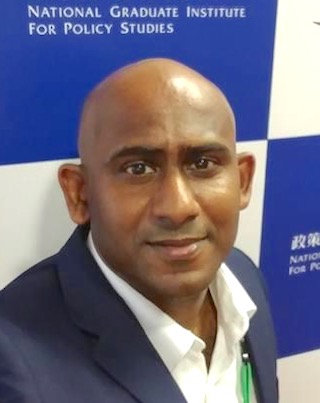 ディヌーシャ ・ヘッティアラッチ
ディヌーシャ ・ヘッティアラッチ
スリランカ関税局
税関監督官
Public Finance Program (Customs Course '15)
Please tell us about your career path so far. What is your area of specialization and how did you come to work in this area?
As a kid, my ambition has always been to become an Information Technology professional. Following my ambition, I completed my undergraduate studies in the year 2005 from two separate universities concurrently, namely, Sri Lanka Institute of Information Technology and University of Kelaniya majoring in Information Technology and Industrial Management respectively. Immediately after graduation, I joined the R&D wing of one of the leading enterprise software vendors in the world today, Industrial & Financial Systems (IFS), as a Software Engineer. After three years of service in the private sector, I moved to the public sector and joined Sri Lanka Customs as an Assistant Superintendent of Customs in the year 2008. In 2010, I completed my MBA at the University of Moratuwa, majoring in the area of Technology Management. During my stay at Sri Lanka Customs, I got the opportunity to work in the Revenue Analysis & Research Unit attached to the Policy Planning & Research Directorate which was functioning directly under the then Director-General of Customs, which was highly influential in my early career giving me a clear understanding on the policy matters related to Customs such as analyzing revenue trends, forecast future trends in imports and exports and how to make policy recommendations based on such information.
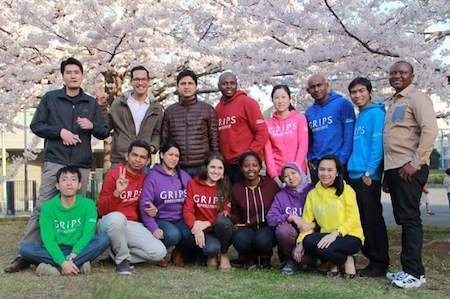
Public Finance Program Batch 2014-15
In 2014, I was fortunate enough to get the opportunity to pursue master's level studies and training in Customs related fields in the Public Finance program at the National Graduate Institute for Policy Studies (GRIPS) in Tokyo, Japan with a scholarship awarded under Japan-WCO Human Resource Development Programme. That gave me immense exposure to the theories of economics and econometrics as well as customs standards, which provided me with a firm base in forming a conceptual understanding and technical competence in the said areas. My background in mathematics, statistics and IT was of immense help in completing the very demanding master's program at GRIPS successfully. Upon return from Japan, I was attached to the Risk Management Unit and my team was assigned with the task of forging the Risk Management Policy for the department and the design and implementation of the Authorized Economic Operator (AEO) Programme which was supposed to be the most significant trade facilitation program offered by Sri Lanka Customs. During my stay at the Risk Management Unit, I got many opportunities to gather the technical expertise required to complete the task I was entrusted with and it was a huge privilege for me to have been selected by the World Customs Organization for its Fellowship Programme in 2017 to do an intensive study on the topic "Organizational Challenges in implementing an AEO Framework in Sri Lanka" under the supervision of technical experts attached to WCO. Today I work as a Superintendent of Customs specializing in the areas of Risk Management and AEO
You have recently been promoted to Superintendent of Customs. What are your main roles and responsibilities?
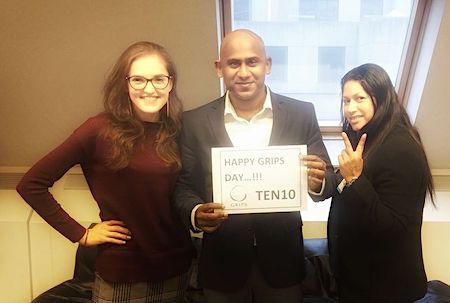
Happy GRIPS Day, 10/10, 2017, with fellow GRIPS alumni in Brussels
Upon my promotion to the post of Superintendent of Customs I was posted in Jaffna Customs - which is a remote regional Customs office, for a period of six months. Main duties here include the supervision of the enforcement activities to detect smuggling and other illegal activities through sea routes and the supervision of the clearance of goods coming through parcel post. In addition, I am still remotely supervising the operations with regard to the Authorized Economic Operator (AEO) program of Sri Lanka Customs.
In your current capacity, what do you see as the main opportunities and challenges for Sri Lanka over the course of the next five to ten years?
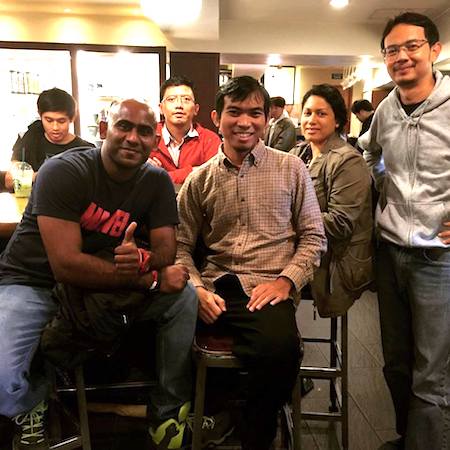
Alumni gathering in Seoul, South Korea (2017)
With due consideration to the status of the present pandemic situation and the impact it has on the world economy and on international trade, Sri Lanka is already facing and will continue to face many challenges in the coming years. Sri Lanka is a country where 57% of the state tax revenue is collected as import duties. However, the recent decline in international trade has impacted both import and export volumes and that resulted in considerably lesser revenue being collected from the imports while widening the trade deficit. With the travel restrictions continuing to be imposed, Sri Lanka's tourism industry is also in peril and that has also not helped the foreign exchange earnings and Sri Lankan Rupee is depreciating rapidly against the US Dollar, increasing the cost of imports. The biggest challenge comes from the country's increasing debts. While being continued to downgrade the creditworthiness by all three global rating agencies, and having to pay back nearly USD 4.5 billion annually until 2025 with a widening trade deficit is going to be the biggest challenge faced by the Sri Lankan economy. However, such challenges bring about opportunities for improvement. With respect to Customs, modernization, process re-engineering and introduction of more trade facilitation measures for compliant traders and especially so for the exporters, would reduce the burdens of red tapes in the international trade in the post-pandemic era and increase the foreign exchange earnings of the country.
What are some of the biggest challenges you face in your work? And what have been the most interesting or rewarding aspects of your career thus far?
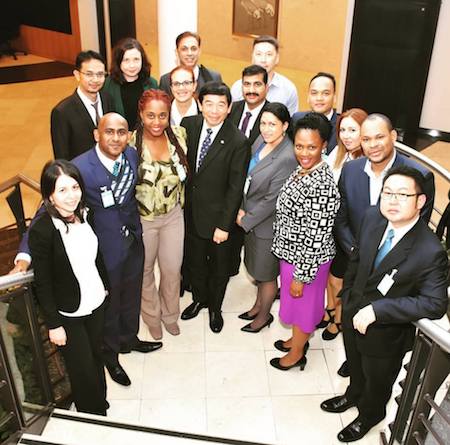
Mr. Kuniyo Mikuriya - the Secretary General of the WCO along with other WCO Fellowship participants in Seoul, September 2017.
The biggest challenge that I have faced during my tenure at Customs was the task that I was entrusted upon return from GRIPS to revamp and structure the Risk Management-related activities of Sri Lanka Customs. Everything was a challenge during the process. From picking up the right team for the job to developing repeatable procedures and mechanisms, development of a framework, re-engineering of certain processes to in-house design and development of IT support systems has been quite challenging and demanding. The biggest challenge of them all was to strategically manage the changes that we have been introducing across the organization. The resistance towards these modernization efforts has taught many a lesson in change management and how to address adversity and resistance during the transformation stage. However, despite such demanding circumstances, the most rewarding aspect of it is to see how the Risk Management aspect of Sri Lanka Customs has advanced and progressed from such a humble beginning to where it is today.
What led you to GRIPS? What is the most important thing you got out of your studies here, and how has your experience at GRIPS prepared you for future endeavors?
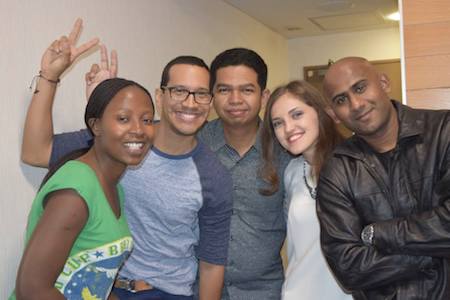
The very first day at GRIPS, October 2014
Ever since I was a kid, I have always been fascinated by Japan and its rise to the present economic, technological and industrial marvel from where it stood at the end of the Second World War. Also, I've always wanted to experience the student life in a foreign country. Thirdly, I wanted to explore into both the conceptual and practical understanding of economics, econometrics and the modern Customs Administration. Therefore, when I got a World Customs Organization scholarship to study in the Public Finance Program (Customs) at GRIPS, it was a dream come true for me. During my stay at GRIPS, I engaged in academic, sports and many other extra-curricular activities. I got elected as the Head of Cultural Affairs at GRIPS International Student Council, where I got the opportunity to organize and participate in many student activities and events involving both international and Japanese students.
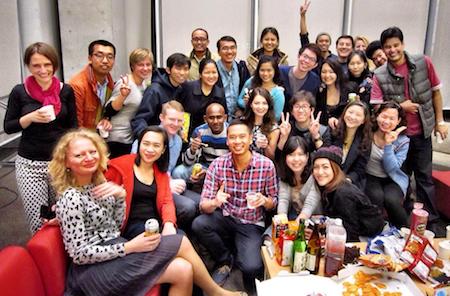
Sake party at the Tokyo International Exchange Center (TIEC), 2015
The Cultural Festival, Fuji mountain climbing expedition and the monthly sake parties we had are the highlights among those memories. Academic, social and professional competencies that I gained at GRIPS have become extremely useful to me in my career and personal advancement. If I am asked to name the most impactful experience during my time at GRIPS, my answer would be the amazing connections that I was able to make with so many different individuals from all over the world. Having made such wonderful friends had made me feel so comfortable during my stay in Japan and continues to make me feel at home whenever I travel anywhere in the world because I know that I have a friend wherever I travel to.
Have you had any involvement, professional or otherwise, with Japan since your graduation?
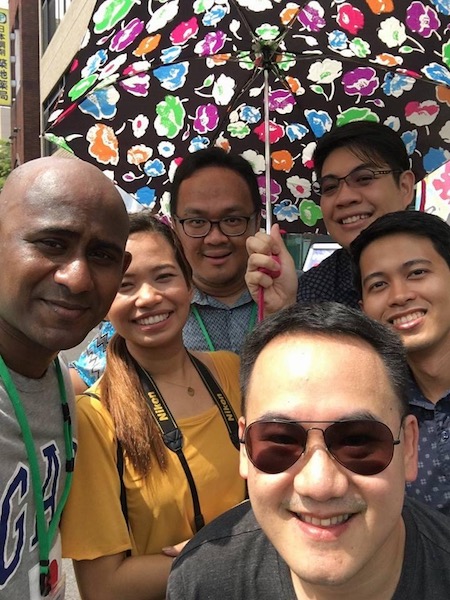
With fellow alumni during the GRIPS 20th Anniversary Homecoming, August 2017.
Since my graduation from GRIPS in 2015 September, I was fortunate enough to have got the opportunity to travel to Japan three times. First such opportunity was when I got invited to participate in the GRIPS 20th Anniversary Homecoming event held under the sponsorship of Japan-Asia Youth Exchange Program in August, 2017. During that program we had the opportunity to witness some of the latest economic and technological developments of Japan and to exchange the post-GRIPS experiences with fellow GRIPS Alumni who attended the event. I was fortunate enough to have another opportunity to visit Tokyo again in December, 2017 for a Risk Management Workshop specifically designed for the officials of Sri Lanka Customs organized and sponsored by the Japan Customs and the Ministry of Finance. Then again I got the opportunity to visit Japan in December, 2018 to participate in the WCO Asia/Pacific Regional Workshop on Authorized Economic Operators held in Kashiwa. All these visits rekindled all the fond memories of my time in Japan and I was fortunate enough to meet some of my Japanese friends and visit GRIPS during each of those visits.
How do you maintain a balance between your work and the rest of your life? And what is your favorite thing to do when you are not working?
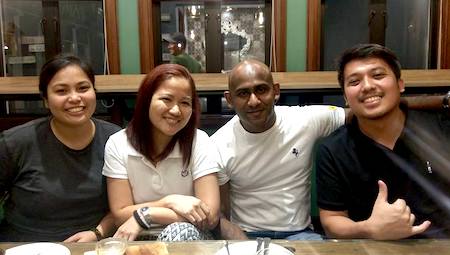
A small alumni reunion in Manila, 2017
I always try my best to have a balance between the professional and personal life. I spend a lot of my free time in the gym to keep myself fit and I also play badminton whenever I get an opportunity to play. I also enjoy reading, especially biographies of some of the great leaders and pioneers in different fields.
Apart from my usual work, I do a lot of volunteer work, especially in less privileged communities. I have participated a lot in engagement programs that focus on financial inclusion and access to finances, education, water and sanitation and health sensitizations.
What are some of your fondest memories of your time spent at GRIPS? And what do you miss about Japan?
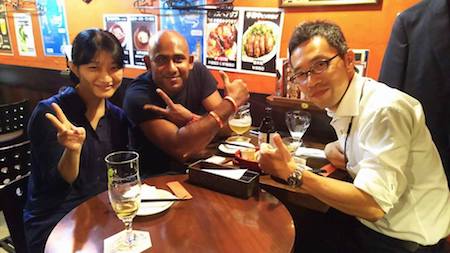
Catching up with Japanese GRIPS friends in Tokyo, 2018
I've had so many fond memories at GRIPS and it is very difficult to set them apart. People in Japan were extremely polite and helpful everywhere and that made it very comfortable despite my knowledge in Japanese being very modest. That comfortable and warm feeling about Japan and Japanese people would always make me feel Japan as my second home. Another thing that I dearly miss from my days in Japan is the amazing friendships that I've made with so many that I met at GRIPS and TIEC. Although most of us are still closely in touch with each other, all the fun memories with them make me miss those days even more. Authentic Japanese cuisine is another thing I dearly miss and crave for since my return from Japan. A few of my colleagues who also have studied in Japan and share the same longing for Japanese cuisine as I do, visit a local Japanese restaurant once a month and get drunk with sake and Japanese beeru imagining us being back in a Japanese Izakaya and remind us of all the fun times we had in Japan.
If you could give one piece of advice to anyone considering studying at GRIPS what would it be?
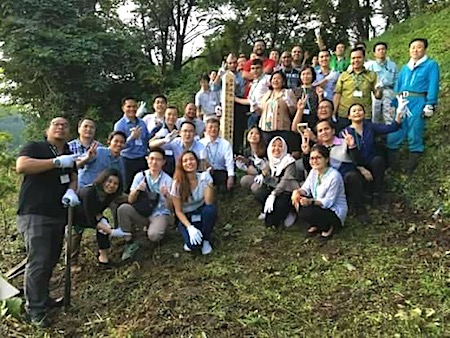
GRIPS alumni planting trees in Tohoku. An activity that was part of the GRIPS 20th Anniversary Homecoming program to help revitalize the area that was so hard hit by the March 2011 earthquake, tsunami and nuclear disaster.
My one piece of advice would be to simply try it without any hesitation. It would be a life-changing experience where you will have one of the best academic and social experiences and, moreover, you will learn a lot about your own self. When you live on your own in a remote country, it will give you a lot of time to reflect upon who you really are and what you want to become in life. Once you get accustomed to the Japanese ways and customs, you will be able to see the world and life through the Japanese ideology "ikigai" where you'll learn to refocus yourself and find the joy in life through your life's purpose. I have been promoting GRIPS among my friends and colleagues and I am extremely happy to see quite a few of them having applied and being selected while those who have completed are being quite successful upon their return.
How would you like to maintain involved with the School? What do you expect from GRIPS as an alumnus and do you have any suggestions on how to further utilize the GRIPS alumni network?
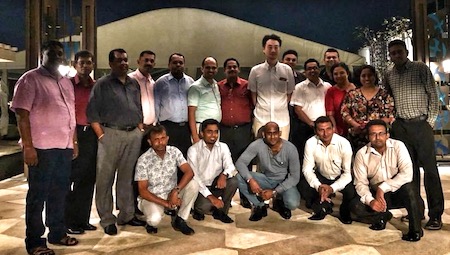
Alumni reunion in Colombo with Hosoe-sensei when he visited Sri Lanka in August 2018.
GRIPS has given me so much and opened up so many avenues for me professionally and has such a special place in my heart. As an alumnus I would love to get more involved with the school in whatever capacity to promote it among potential students and to further strengthen the alumni network. GRIPS can boast of an unparalleled alumni network where most of the alumni hold influential positions in their respective countries. Having such a prestigious alumni network can be used to further enhance the reputation of the Institute and to further attract future leaders from all over the world. Having an active Alumni Committee in each country would be a good way forward where each of these Committees will be constantly in touch with the Alumni Office at GRIPS to identify ways and means to strengthen the alumni network and to further promote GRIPS in their respective regions. .





